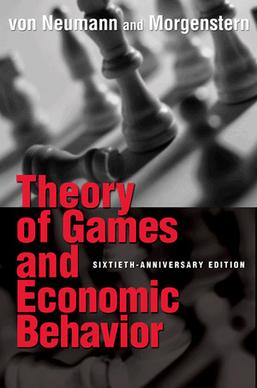Game Theory
- Introduction to Game Theory
- Two-Person Zero-Sum Games
- Non-Zero-Sum and Cooperative Games
- Game Theory in Business and Economics
- Game Theory in Politics
- Psychological Game Theory
- Games of Chance and Risk
- Evolutionary Game Theory
- Games with Sequential Moves
- Game Theory in Social Interactions
- Ethics in Game Theory
- Technological Aspects of Game Theory
- Applying Game Theory in Everyday Life
Introduction to Game Theory
The History and Importance of Game Theory

Written work by John von Neumann and Oskar Morgenstern.
Game theory, a branch of mathematics that studies strategic interactions, has a rich and fascinating history. Its origins can be traced back to the early 20th century, and it has since evolved to become a critical tool in various fields, including economics, politics, and psychology.
The Origins of Game Theory
The formal study of game theory began with the publication of "Theory of Games and Economic Behavior" in 1944 by mathematician John von Neumann and economist Oskar Morgenstern. This groundbreaking work laid the foundation for the field and introduced the concept of expected utility, which is the cornerstone of game theory.
However, the idea of strategic interaction and decision-making can be traced back even further. In the 18th century, Swiss mathematician Leonhard Euler and French mathematician Antoine Cournot made significant contributions to the field. Euler's work on the "Seven Bridges of Königsberg" problem is often considered a precursor to graph theory, a critical component of modern game theory. Cournot, on the other hand, analyzed competition among firms and introduced the concept of a Nash equilibrium, named after John Nash, who would later formalize and generalize it.
Key Contributors to Game Theory
John Nash, a mathematician and Nobel laureate, made significant contributions to game theory in the mid-20th century. His concept of the Nash equilibrium, a state in which no player can improve their outcome by unilaterally changing their strategy, is a fundamental concept in game theory.
Other notable contributors include Reinhard Selten and John Harsanyi, who shared the 1994 Nobel Prize in Economics with Nash for their work on game theory. Selten introduced the concept of subgame perfect equilibrium, which refines the Nash equilibrium for extensive games. Harsanyi developed the concept of Bayesian games, which deal with situations of incomplete information.
The Impact of Game Theory
Game theory has had a profound impact on various fields. In economics, it is used to model and analyze market competition, auctions, bargaining, and public goods provision, among other things. In politics, game theory is used to study voting systems, power dynamics, and international relations. In psychology, game theory is used to understand decision-making and social interaction.
Moreover, game theory has practical applications in everyday life. It can help us make better decisions, negotiate more effectively, and understand the strategic behavior of others.
In conclusion, game theory, with its rich history and wide-ranging applications, is a powerful tool for understanding the world around us. Its concepts and techniques provide valuable insights into the strategic interactions that shape our lives.